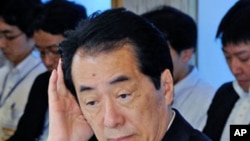Japan's beleaguered prime minister, already in political jeopardy when a huge earthquake and tsunami hit the country four months ago, says the nuclear crisis facing the country will not
compel him to dissolve the lower house of parliament, which would force a national election. It is the latest rebuff by Naoto Kan to those insisting he quickly resign. The standoff between the prime minister and his opponents is raising broader questions about whether Japan’s consensus-building political culture can address the country’s serious challenges.
Unpopular leader
Prime Minister Naoto Kan continues to frustrate many politicians in his own Democratic Party. The 64-year-old unpopular leader has said he will hand over power to a younger
generation, but he has repeatedly resisted indicating when that will occur.
Former Vice Foreign Minister Hitoshi Tanaka is among those who have lost patience with him.
"I wouldn't like to see Prime Minister Kan prolong. He said he would go. Please go. It's not a question to be debated," Tanaka said.
Popular graphic novel writer Kenshi Hirokane laments that even though he is the same age and from the same neighborhood as Kan, he also desires his speedy exit.
Hirokane says the prime minister does not have a clear vision to share with the Japanese people, and no longer has a political support base or many followers.
New vision
Tanaka and Hirokane spoke at a news conference to discuss a new book, Reimagining Japan. Created by the global management consulting firm McKinsey and Company, more than 80 leaders and experts contributed essays to the book about how to bring about a Japanese renaissance following the disaster four months ago. Much of the discussion at the forum centered on political leadership.
There is growing frustration with the revolving door of weak Japanese prime ministers. Kan's successor will be the fifth prime minister in five years.
This frustrates policy makers and many citizens who say it prevents Japan from effectively dealing with serious matters like persistent economic malaise, formulating foreign policy and security issues, including the rise of China. They also say the country needs to focus
on rebuilding the region devastated by the March 11 natural disaster and the resulting meltdown of three nuclear reactors in Fukushima prefecture.
Strong, stable leadership
Former top bureaucrat Tanaka says Japan needs the type of stability and strong leadership it last enjoyed under Junichiro Koizumi, who served as prime minister from 2001 to 2006.
"Do we see any candidate who is comparable to Prime Minister Koizumi's leadership? The answer is no," Tanaka said. "Therefore what we need to be doing is the creating of a system in which we can pursue much stronger, correct policies."
And the only way to do that, Tanaka argues, is for the two major political parties -- which he contends have no major policy differences -- to work together. Such a grand coalition was even proposed by Prime Minister Kan following the March 11 disaster. But the opposition Liberal Democratic Party (which is actually right of center) rejected it. Some political analysts argue that a fresh leader from the Democratic Party may be more persuasive in the months
ahead.
Status quo
McKinsey's Global Managing Director Dominic Barton finds the status quo baffling.
"The issues are clear. We don't need more white papers and so forth. It's why does change not occur? And I don't know why the Japanese people put up with that," Barton said.
Hirokane believes he has the answer to Barton's question.
He says the concept of leadership in Japan is not well-defined, partly because neither Japanese top management nor political leadership is selected by direct election. That is why Japanese prime ministers are changing so frequently. He explains they are too conscious of making mistakes, so they do not take risks as they know if they err they will have to resign right away. Thus the leadership style tends to be bottom up and full of consensus-building, rather than top down.
That worked well in the last half of the 20th century when Japan managed to recover from its devastating defeat in World War II to become a global technological leader.
Needed change
Influential columnist Waichi Sekiguchi of the mass circulation Nikkei business daily says the political system that fostered the renaissance cannot work any longer.
"In the past when the economy was growing well maybe the bottom-up system worked well in this country," noted Sekiguchi. "But now technology trends or society changes very quickly so the top leader will have the new direction immediately. So that kind of new leadership is really needed in this country."
But some observers are cautious, such as Hirokane, whose award-winning comic books frequently take a critical stance on contemporary Japanese society. He and others say the Japanese people really do not want strong leaders. They recall the tragedy of the early 20th century when powerful military and political figures put Japan on a course toward disaster.
Japan Contemplates Leadership Woes Amid Various Crises
- By Steve Herman








